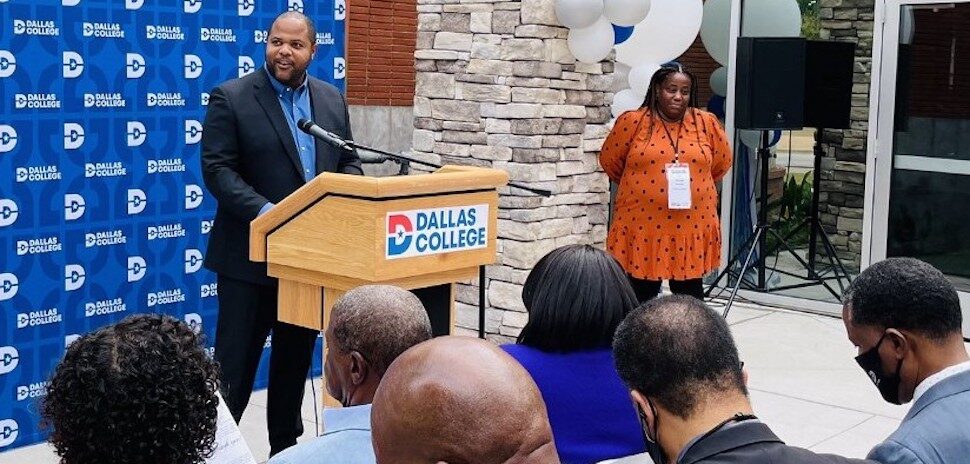Asheya Warren was hungry.
She had a great corporate job writing and reviewing requests for proposals for major construction jobs at Austin Commercial.
During her tenure, she worked on some of the most iconic buildings in North Texas: Museum Tower, Parkland Hospital, and the terminal redevelopment at Dallas Fort Worth International Airport.
While the job paid the bills just fine, Warren’s soul was crying out, looking for a higher calling.
“Our business focus is helping level the playing field from the standpoint of minority and women-owned business to make sure they are competitive and able to win product for their firms.”
Asheya Warren
The kinds of projects she worked on would still come to fruition, she says. “I wasn’t doing anything game-changing from a public service or people standpoint,” Warren notes. The question became, “How are we giving back every day?”
The Oak Cliff native is passionate about the systemic problems that plague South Dallas, specifically, and more broadly, minority and women-owned construction contractors.
Her experience at Austin Commercial gave her first-hand knowledge of the RFP process and the challenges minority companies have in getting projects bid.
“I saw a real gap in what they were able to provide from a collateral, branding, and strategy standpoint,” she says. “There’s a lack of representation across the board for people of color. That became another passion point for me.”
She’d found a problem, and she had the expertise to do something about it.
In 2012, she took a leap of faith, leaving her job of nine years to found Praxis, a niche marketing firm that focuses on branding, proposal management, and strategies for minority and women-owned businesses.
“Our business focus is helping level the playing field from the standpoint of minority and women-owned business to make sure they are competitive and able to win product for their firms,” Warren says. “The marketing and business development side of the architectural industry is unique and niche-based.”
Warren also became the first African-American president of the Society for Marketing Professionals Dallas Chapter where she served two terms. She joined SMPS in 2006 and says it’s played a large role in her career development.
A heart to give
Warren’s heart has always been about giving back, whether she’s on the Mayor’s Star Council, Dallas’ GrowSouth Task Force, or the board for Harmony Community Development Corp.
The HCDC is a nonprofit organization founded by Concord Church that advocates and helps people in need with a food pantry, counseling center, and workforce development.
A recent grant from The Real Estate Council funded an expansion of the food pantry last year, allowing them to open a “micro-grocery store” where clients can shop for items rather than just taking prepackaged boxes or baskets, she says.
“Our future is bright, but we need to make sure we understand how we got where we are…”
Ayesha Warren
“It brings some dignity to the experience and allows them to factor in the states and preferences of their family,” Warren says.
As part of GrowSouth, she’s working with the Dallas City Council and the Department of Urban Planning for Southern Dallas to stimulate economic activity and opportunities for the Red Bird area.
Warren’s firsthand knowledge of the challenges faced by Southern Dallas made her an important voice for Leadership Dallas in 2018. Leadership Dallas is the Dallas Regional Chamber’s flagship program for leadership development.
“There was a need for some real world ‘This is what it looks like on a day-to-day basis,” Warren says. “Our future is bright, but we need to make sure we understand how we got where we are: ‘What were the root causes?’”
Deep divides still linger along racial lines that affect educational opportunities, civil rights, access to jobs, economic development, and health, she says.
“We can’t move forward until people recognize the privileges and the causes of those privileges and the lack thereof for others,” she says. “They’re rooted in racist policies and systems that were created years ago.”
If she could fix any problem in Southern Dallas, it would be lack of access to early childhood education.
“That’s where the real differences are,” she says. “Kids are exposed early and have options early and start to understand the breadth and depth of the world around them.”
Warren wants to kick-start young minds into thinking about careers in architecture and construction. Praxis teamed up with the National Organization of Minority Architects North Texas chapter and architecture firm LPA to host the Hip Hop Architecture Camp in Dallas this year.
The event let middle school students experience these careers in a fun and exciting way that mixes urban planning and hip hop music, Warren says.
The same approach has been used in New York City to show how dense concentrations of people in urban areas contribute to poverty. The camp also shows children that the construction industry isn’t just workers with shovels and tractors—there are a lot of important jobs, from construction manager to accountant.
“It’s a fun way to expose them to something they may not know is a possibility,” she said. “There are a lot of misconceptions about our industry. You can be making six figures a year, if not more.”
Read the digital edition of Dallas Innovates’ sister publication, the Real Estate Review, on Issuu.
Sign up for the digital alert here.
![]()
Get on the list.
Dallas Innovates, every day.
Sign up to keep your eye on what’s new and next in Dallas-Fort Worth, every day.





































































